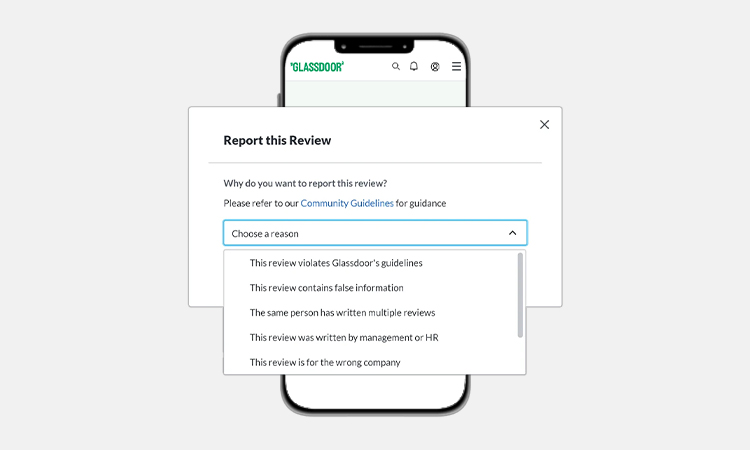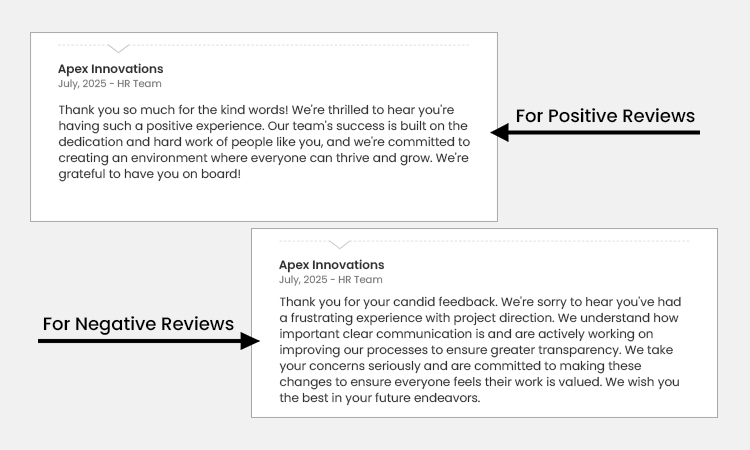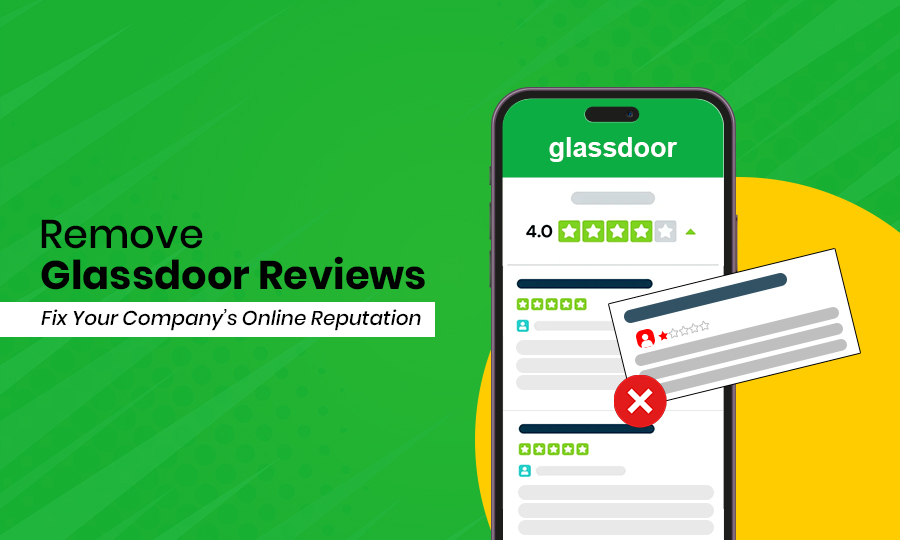In today’s new era of online reviews, Glassdoor has emerged as one of the most popular review platforms, relied on by thousands of employees and job seekers. While good reviews on Glassdoor attract top talent and build a positive digital image of a company, negative reviews can significantly harm its brand reputation. So, what can you do with the negative Glassdoor reviews? You can learn the beneficial strategies and tips to remove Glassdoor reviews.
In simple words, Glassdoor reviews can either make or break a company’s online reputation. A Glassdoor study has revealed that 83% of candidates check Glassdoor ratings and reviews before applying for a job at a company.
This makes it essential for every company to establish and maintain a positive reputation with good reviews on Glassdoor.
Yes, we know that it’s common for companies to receive some negative reviews! But removing harmful reviews on Glassdoor is a great way to prevent damage to your online brand image. Here in this guide, we’ll cover some helpful strategies to remove negative Glassdoor reviews and boost your company’s digital reputation. Let’s get started!
What are Glassdoor Reviews?
These are feedback posted on an online review platform named Glassdoor by current and former employees about their working experiences in a company. Glassdoor reviews are often related to the following aspects of a company –
- Internal culture
- Salaries and financial benefits
- Company Management
- Employee benefits
- Work environment and company atmosphere
- Work-life balance
- Interview experience
Additional benefits for job seekers: Glassdoor helps job seekers find the most suitable workplace for them by allowing them to monitor a company’s reviews and address concerns shared by its former and existing employees.
Can a company receive anonymous reviews on Glassdoor? Yes, the platform provides employees with an outstanding opportunity to share their reviews from an anonymous Glassdoor profile. So that they can share their thoughts and opinions about a company without any hesitation or fear of being fired from their job.
Apart from them, a company can effectively monitor their Glassdoor reviews to improve its business operations and reputation.
If You Own a Business
It’s completely natural to get both positive and negative reviews on Glassdoor.
Always remember, you cannot expect every employee of your company to be happy with their job experience! There’s nothing offensive, as every employee can have different opinions and not everyone feels the same way.
For example, a company organizes pizza parties after working hours on Saturdays. Some may love these types of arrangements after a hectic day at work.
Some employees may feel that it’s just a waste of their precious time, and the company should announce a week off on Saturdays instead of organizing such irrelevant parties. The other half can even share their negative experience regarding this on Glassdoor.
It’s just a difference in employee opinions! However, it’s also possible for a company to have a negative work culture that often leads to its employees sharing their bad experiences on platforms like Glassdoor.
Negative Glassdoor reviews, no matter what the reason behind posting those reviews, can be equally harmful to a company’s reputation. Many of your potential employees tend to prefer to check Glassdoor reviews of your company before joining. Thus, it’s crucial to prioritize maintaining your company’s reputation on Glassdoor with the right strategies.
Why Do Glassdoor Reviews Matter?
Have you witnessed a sudden drop in your company’s employment applications?
If yes, then the increase in your company’s negative Glassdoor reviews can be a major reason behind this!
A low rating on employee review sites like Glassdoor can severely impact recruitment and a company’s growth. Retaining top talent can save your company from this loss! While effective strategies can help a lot, understanding why Glassdoor reviews matter for a company can help you develop these robust strategies and implement them.
- Direct Influencer on Job Seekers and Prospective Employees
Did you know that 55% of job seekers who check Glassdoor are less likely to apply to companies with poor ratings on their page?
Yes, you heard that right! It works as a decision-making tool as a majority of candidates highly rely on Glassdoor reviews to determine whether a company is a suitable workplace choice for them or not. Positive reviews on this platform influence potential hires and encourage them to join a company. Additionally, positive Glassdoor reviews act as a stamp of approval, and negative ones deter top talent from even applying.
- Significant Impact on SEO and Online Visibility
Want to remove Glassdoor reviews that can harm your firm’s online reputation? You’re on the right track, as reviews on Glassdoor are considered a significant online ranking factor. Companies with positive Glassdoor reviews often rank higher in relevant online searches.
This is because Google’s algorithm considers these companies as reputable and credible enough to appear on the first page of its search results. Glassdoor reviews act as social proof for job seekers and also add credibility to a company.
- Determines the Company’s Online Reputation
Glassdoor reviews are directly associated with a company’s online reputation. It provides transparency into a company’s actual culture, practices, and management style, allowing job seekers to honestly evaluate how their experience can be working in a specific company.
A noticeable number of negative reviews and low ratings on Glassdoor showcase a company’s poor reputation among its employees. It can have serious consequences like loss of top talent and poor business relationships with stakeholders, followed by an overall negative online reputation.
- Perception of the Internal Culture of the Company
Yes, it’s true that people will form a perception about your company based on what they see in Glassdoor about it. They will perceive the internal culture and business operations you’ve within your company.
Similarly, it offers an employee feedback channel for the human resources and management team to identify employee sentiment and their areas for improvement. Based on the insights received through Glassdoor, they can take necessary actions on employee concerns and improve their work experience.
Can You Remove a Glassdoor Review?
This is one of the most common questions for the majority of businesses – a burning question for the hiring managers and talent acquisition teams!
Companies with less than a 4.0 rating are often concerned about how to improve their Glassdoor ratings or remove reviews that can affect their hiring metrics.
The answer is YES! It’s possible to delete a Glassdoor review, but the Glassdoor review removal process is not straightforward. Glassdoor has set criteria for which types of reviews can be removed and which can’t be.
Some key factors to remember here:
- You cannot remove a Glassdoor review just because you don’t like it. You need to provide valid reasons to remove a specific review.
- The review removal depends on the review violating Glassdoor’s Community guidelines.
- You can flag inappropriate reviews for violating these guidelines or the privacy policy.
It usually takes nearly 3 months to fill a position in a company. Imagine one of the great candidates is about to join your company, but has come across the negative Glassdoor reviews your company has received.
Unfortunately, the potential employee steps back from joining your company. Now you need to start the recruitment process from ‘point 0’. Disappointing, right?
Negative reviews on Glassdoor can be your company’s worst nightmare. According to a 2022 Talent Branding study, the presence of negative Glassdoor reviews can lead to a 5.9% decrease in share prices for an S&P 500 company. In the next section, we’ll talk about Glassdoor’s criteria for review removal.
Sounds complex? You can seek professional content removal services to ensure a successful removal of negative reviews from your company’s Glassdoor’s profile.
Criteria Checklist for Glassdoor Review Removal
If you want to remove negative Glassdoor reviews, the reviews must align with the platform’s community guidelines. Before you decide to remove a Glassdoor review, you must understand whether that specific review meets the Glassdoor review removal criteria.
Some major policies of Glassdoor’s Community Guidelines are as follows.
- Authenticity – When a review contains misleading or false information about your company
- Conflicts of Interest – When a review is posted by someone with a conflict of interest, such as your company’s competitors or even insiders
- Inappropriate Content – Aggressive and offensive reviews that contain threats, explicit language, or any discriminatory remarks
- Privacy – Reviews that share confidential information about your company without your consent
- Promotional Content – Glassdoor reviews that contain promotional content or are more like advertisements
- Assumptions – Speculative reviews that reflect a direct personal account
- Misidentification – Reviews intended for another company
- Non-representative – Reviews that focus on atypical events or don’t represent the standard employee experiences
How Can You Remove Glassdoor Reviews?
Effective removal of Glassdoor reviews is quite complex and requires your constant efforts. You can’t expect that Glassdoor will remove negative reviews instantly after receiving your appeal.
The process takes time and often offers no guarantee!
Yes, we cannot guarantee that Glassdoor will surely remove the review against which you’ve appealed. The platform has its unique community guidelines, based on which it will measure whether the review meets the criteria of the removal policy.
However, we’re providing you with a guide to remove Glassdoor reviews that can damage your company’s online reputation and encourage a negative public perception about it. Let’s have a look at the practices that you can consider if you want to delete Glassdoor reviews.
- Provide Legitimate Reasons for Removing Reviews

Do you have enough valid reasons to remove a specific review on Glassdoor?
If not, then you may not be able to remove that review from the platform. Providing legitimate reasons why you want to delete a specific review and how it can harm your firm’s online image is crucial in this process.
Without any valid reason, Glassdoor will not consider your review removal appeal valid. Now the question comes – which reasons are considered the major ones according to Glassdoor’s community guidelines?
Fact-check: If the review you want to remove has violated Glassdoor’s terms of service, it contains harmful and misleading information about your company, then only the platform will consider your claim legitimate.
Here are some major reasons that Glassdoor considers valid for removing a review from its platform.
- Content Policy Violations – Does the Glassdoor review you want to delete violate Glassdoor’s content policy guidelines? Does it contain offensive language and personal attacks? Or is it an incentivized feedback?
If the reviews meet all these checklists, you can appeal to Glassdoor to remove these off-topic and irrelevant reviews.
- Hate Speech, Harassment, and Threats – Sometimes, employees threaten the company in their reviews due to a negative work experience. You can appeal to Glassdoor to delete these reviews.
Additionally, reviews that contain discriminatory language towards any individual of your company, based on their religion, gender, sexual orientation, race, or any other characteristics.
- Disclosure of Confidential Information – Every company has its own confidential information, including financial details, system credentials, trade secrets, property information, sensitive business strategies, and more.
Any employee who wants to share a negative Glassdoor review about your company can disclose this confidential information in the review with a vengeful intention. Companies can appeal to Glassdoor to remove these types of reviews.
- False Claims – Many Glassdoor reviews contain demonstrably false information about a company. Former employees can write false data about the working conditions or employment practices, or the company, to malign its reputation.
For example, an employee has received a lower appraisal from the company. After exiting the firm, he/she has written a Glassdoor review, exaggerating the incident and claiming to have received a lower appraisal than what he/she actually received. These inaccurate claims can be a major reason to remove a specific review from Glassdoor.
- Reviews Posted by Competitors and Non-Employees – In today’s competitive digital era, it’s quite common for a company to receive fake reviews from its market competitors. Many brands engage in the practice of sharing false reviews to damage their competitors’ online reputation. Sometimes, even Glassdoor users who are not the current or former employees of your company post negative reviews to harm its reputation.
Thus, you must know how to handle these negative reviews posted by competitors and non-employees. You can appeal to Glassdoor to remove these reviews as well. The platform usually removes these reviews that are disingenuous or intended to harm your firm’s reputation.
- Patterns of Abuse and Fraud – Does the review you want to remove contain manipulative or abusive language? If yes, you can inform the Glassdoor team about these reviews being completely fraudulent.
These types of reviews are often a part of a coordinated effort to manipulate the public perception about your company. These can also be the result of a pre-planned campaign against your firm.
Glassdoor is one of the employee review platforms that ensures all the reviews it has are authentic and provide valuable information to every job seeker. So, to protect its users, the platform removes reviews that violate its policies and maintains its integrity.
- Flag and Request Review Removal
Do you know that 1 in every 3 people tend to decline job offers due to potential employers’ negative online reviews?
If you have a noticeable number of bad reviews on Glassdoor, it can actually deter great candidates from accepting job offers from your company. Losing top talent can prove to be a significant drawback for your company.
Negative employee reviews aren’t necessarily true!
Sometimes, people can intentionally post negative reviews to damage a company’s reputation. The only way to get rid of these reviews is to remove them from Glassdoor.
A Step-by-Step Guide to Request Glassdoor Review Removal
The following are some easy steps to report a Glassdoor review and request its removal from the platform.
Step 1: Log in to Your Employer’s Glassdoor Account
To remove Glassdoor reviews, the first step is to log in to your employer’s Glassdoor account. It’s important to report a review from your employer’s account. Find your company profile and the specific review that you believe has violated Glassdoor’s policies.
Step 2: Navigate to the Review You Want to Remove
Found the review? Now it’s time to report it for violating Glassdoor content guidelines. You need to click on the ellipses icon, which is located in the upper-right corner of the review.
Step 3: Provide the Reason
You need to provide a valid reason for your review removal appeal so that the Glassdoor community care team can determine whether it’s valid to remove the specific review or not. When you click on the ‘Report’ button, you can see a drop-down list of some reasons.
The options are as follows –
- The review was written by management or the Human Resources team.
- I want to comment on this review.
- The review is for the wrong company.
- The same person has written multiple reviews.
- The review contains false information.
- None of the choices above applies.
You need to choose a reason among these options to explain why you want to report the review. You can add additional comments or references to provide them as proof and support your claim.
Step 4: Report the Review
Now that you’ve already provided the reason for your appeal to remove a specific review from Glassdoor, you need to click on the ‘flag’ icon or ‘Report’ link, which you can find under the review. Submit your appeal to Glassdoor’s team to assess the review and the user who has posted it.
Step 5: Wait for Moderation
Now it’s your turn to wait for a response from Glassdoor’s team regarding their decision. Meanwhile, you can also contact the team directly to initiate meaningful communication regarding your appeal to remove the review.
The Glassdoor team typically responds within a few business days. You must always keep an eye on your email to check if you’ve received a reply from their end.
Follow the steps below to contact the team –
Navigate to the ‘Contact Us’ section > select your preferred language > choose the relevant topic for your request to remove negative Glassdoor reviews > select an option to report or flag the inappropriate reviews
- It requires you to fill out a form by providing essential details such as your name, email address (which is associated with your Glassdoor account/company’s account).
- Then, type a compelling subject for your message. (e.g., Request to Remove a Glassdoor Review)
- Provide supporting documents like screenshots or additional evidence. Now, you can click on ‘File Upload’ to attach those files.
- We suggest you clearly describe the issue with the reviews you’re reporting in the message box given in the form. Always add as much information as possible to help the Glassdoor team in their review assessment process.
- You can provide the date of the review, the reasons why it has been violated Glassdoor’s guidelines, or any specific section in the review that requires extra attention or is a matter of concern.
- After providing these details, you need to complete the captcha verification to prove that you’re not a robot, and finally submit your form.
We suggest you cross-check the details you’ve provided to ensure accuracy and submit the form only after carefully checking the details.
Step 6: Consider Legal Options (If Necessary)
If every technique we’ve mentioned above fails, you can consider legal action. Before you take the legal route, it’s important to understand –
- Glassdoor protects user anonymity.
- If you are involved in legal procedures, it can draw more negative attention to the review.
- To take legal actions, you need to prove a claim like defamation with legal counsel.
- You must check if it is a defamatory Glassdoor review that contains any statement you can prove false, or it can be easily removed from the platform with a valid appeal.
What to expect if you consider legal options?
- A content moderator from Glassdoor’s team will review your report.
- If the team finds that the review has violated community policies set by Glassdoor, the platform will remove it.
- However, it’s also possible that Glassdoor will refuse your review removal request if they find that the review hasn’t violated any content guidelines.
A bonus tip for you! The best way is to seek legal counsel by hiring an expert. If Glassdoor doesn’t remove the review even after you report it, you can hire a legal professional or attorney. The expert can offer valuable advice on whether the review meets the legal standard of defamation.
This is only applicable when you’ve enough evidence to prove your claim that the review content is demonstrably false.
Seeking legal counsel can be expensive and complicated! So think carefully before getting involved in such legal practices.
What can the legal expert do to remove Glassdoor reviews?
- Defamation lawsuit – He/she can file a lawsuit to make Glassdoor remove the review.
- Protecting anonymity – The legal expert can also prove defamation using your provided references, but without revealing the identity of the reviewer.
- Evidence – Based on your evidence, the attorney can plan his/her actions to ensure the removal of the Glassdoor reviews. Because Glassdoor may not directly accept such evidence.
What You Can’t Do when Removing a Glassdoor Review?
Till now, we’ve been discussing the steps that you must consider if you want to remove a Glassdoor review. Now we will talk about the practices that you shouldn’t do when removing a Glassdoor review.
Review removal from Glassdoor is a complex process. If you perform the following practices, it can make the process more complex, and Glassdoor may never consider removing the reviews.
- Never Post Fake Positive Reviews on Glassdoor
Thinking of posting fake positive reviews to boost your company’s reputation on Glassdoor? This idea is not at all great! Sharing fake Glassdoor reviews can be considered review manipulation, which is a major violation of Glassdoor’s community guidelines.
It can lead to financial penalties as well as significant legal consequences. Rather, you can encourage your employees to share their genuine reviews and real working experiences to maintain the authenticity.
- Avoid Bots and Review Farms
There are many bots and review farms that help companies to generate fraudulent reviews to improve their online reputation. Companies should not use bots or any other AI-driven tools to generate fake positive reviews for Glassdoor.
Review platforms like Glassdoor are more likely to identify these suspicious patterns in the reviews, such as activity from a single reviewer or similar device configurations. Companies shouldn’t send automated requests to gather feedback from their employees – it also involves the use of bots to generate these automated requests.
- Never Bribe or Threaten Your Former Employees
You should never offer money or any incentives to your employees to share positive reviews about your company. It’s against Glassdoor’s review community guidelines. Doing so undermines the neutrality and credibility of the platform.
Threatening your former employees who have shared negative job experiences at your company. Additionally, you must not pay Glassdoor or its moderators to remove a review from the platform.
- Don’t Use Black-hat SEO Tactics
Many companies employ deceptive SEO tactics to surpass negative reviews in favor of fake positive ones. This is a complete violation of Glassdoor’s community guidelines. The platform tends to consider this act as review manipulation and announces penalties for the companies.
Note: Black-hat SEO tactic refers to the techniques of increasing a page’s search engine rank that have already violated a search engine’s terms of service. The practice commonly includes –
- Using private link networks
- Content duplication
- Sneaky redirects
- Hiding or disguising some content
- Keyword stuffing to improve search result ranking
7 Significant Ethical Alternatives to Glassdoor Review Removal
Are you struggling to remove negative Glassdoor reviews?
Don’t worry! There are some significant ethical alternatives as well. If all your efforts to remove Glassdoor reviews are going in vain, you can consider these alternatives. Below, we have talked about the 7 most effective ethical alternatives to Glassdoor review removal.
- Ask Your Employees to Leave Genuine Reviews

The best way to collect genuine reviews is to ask your employees in the right way. It fosters a company culture where honest employee feedback is valued.
How and why? Always ask your former and current employees transparently and directly to share their experience of working in your company. You can also explain the benefits of authentic reviews for your company’s reputation. When you directly communicate such things to your employees, they’re more likely to understand your concerns.
As a company authority, you also need to mention that you’ll sincerely maintain the anonymity of the employees who’ll share their reviews on Glassdoor and ensure a safe environment to prevent their fear of retribution.
Key Things to Remember:
- Don’t pressurize – You need to avoid pressuring your employees to share positive feedback.
- Never offer incentives – Thinking of offering incentives to your employees for leaving positive reviews on Glassdoor? You shouldn’t!
- Never violate Glassdoor’s policies – You shouldn’t perform any practices to gather more employee reviews, as it undermines the trust by being against the Glassdoor policies.
- Explain your reasons – Always clearly explain why you’re asking for Glassdoor reviews and mention that no matter what the feedback will be, if they’re honest, they’re valuable for the company.
- Welcome negative feedback – Highlight that the company welcomes criticism along with genuine appreciation.
- Encourage Your Existing Employees to Share Real Experiences

Despite asking for reviews, you should encourage your existing employees to share their real experiences of working in your company.
Why? It will foster a psychologically safe and high-trust environment through open communication with your employees. It will also make storytelling a noticeable part of your company culture.
Key Factors to Remember:
- Promote employee success stories – You can highlight employee testimonials through various internal and external channels.
- Encourage more genuine reviews – Lead by example through integrating personal anecdotes into meetings and communications to encourage more employees to share their experiences.
- Regularly follow up – You can also follow up with your review requests to remind your current employees to submit their genuine reviews on Glassdoor.
- Focus on Your Review Volume and Balance

It means increasing the number of reviews while maintaining a good balance of both positive and negative feedback.
Does your company’s Glassdoor profile only have positive reviews? If yes, then it is more likely for your potential hires to consider those reviews as fake. Because it’s nearly impossible for a company to receive only positive feedback.
A high volume of various types of reviews showcases the reliability of your company and makes the crucial information more accessible for your potential hires.
Some helpful tips for you:
- You need to actively solicit reviews from your employees.
- Never forget to respond to all types of reviews – no matter whether they’re native or positive.
- Ensure all the Glassdoor reviews you’ve received are current and contain recent information.
- Respond Professionally to Glassdoor Reviews

Effectively handling employee reviews is a crucial element to ensure the success of corporate branding. There are certain guidelines you need to follow when responding to your employee feedback on Glassdoor.
Delayed response to reviews?
Forget to appreciate the employee who has shared positive reviews about your firm?
Failed to address the concerns of a former employee?
These are some factors you should never do if you want to leverage your employee reviews to attract top talent and enhance your company’s online image.
For negative Glassdoor reviews –
- Show gratitude – You can start by showing gratitude to the reviewer for sharing their valuable feedback and acknowledging their concerns.
- Address concerns – You should mention specific points in your response that the reviewer has raised. Explain the steps you’re planning to take to improve the situation.
- Maintain a positive tone – Don’t be too emotional or sarcastic while responding to any reviews on Glassdoor. You should always maintain a positive tone, avoiding corporate jargon
- Handle offline – For reviews containing extreme criticism and negative feedback, you can request the reviewer to connect with the HR team of your company for further discussion.
- Report if necessary – If you think that the negative Glassdoor review violates Glassdoor’s guidelines, you can report or flag it as inappropriate instead of responding. It’s one of the best ways to remove Glassdoor reviews.
For positive reviews –
- Go beyond a ‘Thank You’ – Writing a simple ‘Thank you’ may not always work, as it doesn’t showcase how much you actually value your employee feedback. You can rather highlight certain points in the reviews while responding.
- Ensure the appropriateness – You must ensure your review response is appropriate and aligns with Glassdoor’s content guidelines.
- Respond promptly – Time plays a huge role in showing how much you care. When you swiftly respond to positive employee feedback, it shows that you’re actively tracking the reviews you’re receiving and are concerned about what your employees have to say about their working experience at your company.
- Personalize your response – You can address the reviewers by their name while responding to their reviews.
Hiring a reputable review management agency can help you learn the secrets of effectively handling online reviews.
- Improve Your Internal Company Culture

This is one of the easiest ways to collect positive reviews from your former and current customers.
Fact-check: When your internal company culture is something to be appreciated, your employees will naturally share their best experiences working in your company.
To improve the internal company culture –
- Focus on your core values and ensure transparent communication with your employees.
- Recognize employees who have excelled in significant segments of their work responsibilities. This way, they will feel more valued and encouraged to work with more passion and dedication.
- Organize programs to improve employee well-being and autonomy.
- Provide meaningful growth opportunities through incentives like fair feedback, appreciation, inclusive practices, deserving appraisals, and flexible work culture.
- Regularly assess your company culture with employee surveys and try to adapt to their requirements to establish a high-performing and cultured workplace.
- Provide a Smooth, Positive Experience when Onboarding

How your potential employees’ onboarding experience will be determined a lot!
Companies must ensure that they provide a supportive and friendly environment while onboarding a new employee in their organization. If you succeed in leaving a positive first impression on your new employees on their first day at work, nothing will be better than this!
According to a 2017 SHRM organization, 69% employees are more likely to stay in a company for three years if they receive a great onboarding.
Here are some key tips to offer the best onboarding experience for your new employees.
- Community in advance – Always send an email in advance, mentioning the arrival time at the office, the dress code they need to follow, and who they should meet after reaching the workplace.
- Prepare their workspace – You should ensure that all passwords and tools are ready before a new employee joins the team.
- Offer welcome kits – A small gift with a personalized welcome note can make the new employee feel valued from the very first day.
- Assign a mentor – New joiners are more likely to have numerous queries. You can assign a senior employee to offer guidance and resolve their concerns.
- Facilitate team integration – To foster a collaborative and positive work environment, companies should always schedule one-on-one meetings (team lunches or social events) between the new joiners and other team members to help them know each other better.
- Provide an office tour – Offer a physical tour of the office and introduce the new employees to the most important team members and department leads.
- Avoid overloading with work during the initial days – Never overload the employees with unmanageable work on the first day, as it’ll make them feel pressured.
- Provide hands-on experience – Assign them work instead of just discussing work responsibilities. Hands-on work experiences will help the new joiners engage more in training.
- Regularly check their progress – During the first few months, managers and the HR team should always conduct weekly meetings with the new employees to monitor their progress.
- Actively ask for feedback – Ask the new hires for their initial experiences of working at your company, and also about their onboarding process. You can also ask them to share their opinions on the aspects that require improvement.
- Conduct Internal Employee Surveys and Exit Interviews

Employee surveys and exit interviews play a major role in collecting employee feedback. Create a set of open-ended questions and conduct the interview in a private setting.
The data you’ll get through these surveys and interviews is also a form of employee reviews that will help you understand your employees’ perception of your company.
Follow these steps to ensure maximum impact of employee surveys and exit interviews.
- Schedule the interview in advance – You need to inform your employee who’s leaving the company about the exit interview well in advance.
- Prepare a good set of questions – You must set a good set of valuable questions related to employee experience, compensation, company culture, job satisfaction, and more.
- Explain the purpose – Explain to your employees why this exit interview is important and describe the purpose of conducting the same.
- Be a neutral listener – As an interviewer, you must be an active listener and effectively gather crucial information. Always remember, an exit interview is not for debating or defending your company – it’s about collecting valuable feedback from your off-boarding employees.
- Maintain confidentiality – Reassure the employee that you truly value his/her feedback and that everything that he/she has shared will be confidential. You can also mention that their feedback will only be used for organizational improvements.
- Document feedback – You must take detailed notes to capture the important insights, concerns, and suggestions.
Some Key Questions to Cover in Exit Interviews
Below we’ve provided some question examples from which you can take references.
- What encouraged you to look for a new job?
- How would you describe our company culture?
- What did you find the most and least satisfying about your job position?
- Did you receive the required support and resources to do your job effectively?
- What could have been done to retain you as an employee in our company?
- Are you satisfied with your recent appraisal? If not, why?
- Would you recommend our company to others? Why and why not?
FAQs
Here are some frequently asked questions about the removal process of Glassdoor reviews.
Glassdoor reviews usually stay online until they are deleted by the user or removed by Glassdoor for violating community guidelines. However, reviews on Glassdoor are filtered out if they’re on the platform for more than five years and are no longer relevant. Glassdoor ensures that job seekers see the most current information about a company by publishing only the most recent reviews within 364 days. You need to follow certain tactics to remove Glassdoor reviews from the platform.
Yes, employers can sue the Glassdoor platform. But their lawsuit often fails as Section 230 of the Communications Decency Act protects the platform from liability for user-generated content. The act safeguards Glassdoor from most legal actions regarding online reviews. Furthermore, employers can even face financial penalties and legal costs for filing cases against Glassdoor. On the other hand, if it is a false or defamatory review, the court may force Glassdoor to disclose the user’s identity.
Yes, it is. A company can ask its employees to share reviews. While a company can request genuine employee feedback, it’s essential not ot violate the terms of service of the platform where the employees will share their reviews. As a company authority, you shouldn’t pressure any employee to share positive employment experiences as it can be considered review manipulation and potentially harm your company’s reputation.
The answer is yes. You can sue an employee for defamation if their Glassdoor reviews involve false statements of fact that can harm your company’s brand reputation. The process is quite complex, as Glassdoor usually doesn’t reveal its reviewers’ identities and showcases them as anonymous users. Thus, you need to provide valid evidence of defamation to the court. However, we suggest you try to remove the review by appealing to Glassdoor by providing valid reasons. If that fails, you can file a lawsuit against that anonymous reviewer and appeal to Glassdoor to reveal his/her identity.
Conclusion
Received some negative employee reviews on Glassdoor? Is it affecting your company’s online reputation? Do you think that these reviews have violated Glassdoor’s community guidelines?
If yes, then it’s time to appeal to Glassdoor to remove those reviews before they significantly destroy your company’s online reputation. Just like any other thing, it has a unique process as well. You need to follow certain important steps to remove Glassdoor reviews that can harm your company’s online reputation.
We hope that our comprehensive guide will help you follow the steps correctly and ensure the removal of the negative Glassdoor reviews. If you don’t prioritize removing a review even after identifying that it has violated Glassdoor’s content guidelines, it can significantly damage the reputation your company has earned over the years. You can also seek professional online reputation management services from a reputable agency.

